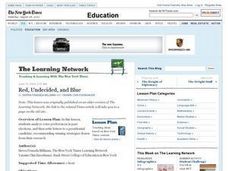Curated OER
Active Viewing: Abraham and Mary Lincoln: A House Divided
Young historians consider the cause and effects of the Emancipation Proclamation. They use handouts, response sheets, and class discussion to build an opinion about the subject after viewing the PBS documentary Abraham and Mary Lincoln:...
Curated OER
Abraham Lincoln, the 1860 Election, and the Future of the American Union and Slavery
High schoolers examine Abraham Lincoln's political views about slavery. In this American Civil War lesson, students determine how Lincoln's beliefs led to the restriction of slavery in American territories. Student also analyze the party...
Curated OER
Lincoln, Emancipation, and the Constitution
Students determine how President Lincoln promoted emancipation. In this slavery lesson, students examine primary documents, including the U.S. Constitution, to reconstruct Lincoln's attempts to end slavery and deliver the Emancipation...
Curated OER
Stage a Debate: A Primer for Teachers (Lincoln-Douglas Debate Format)
For a comprehensive overview of debate styles and formats, look at this resource. It details the Lincoln-Douglas debate format (one-to-one debate with specific, timed rounds of points, cross-examination, and rebuttals). You can also find...
Curated OER
Abraham Lincoln on the American Union: " A Word Fitly Spoken"
Young scholars consider Lincoln's perspective. In this presidential perspectives activity, students explore the political thoughts of Lincoln through a series of lessons that make use of primary source analysis. They hypothesize and take...
Curated OER
Election of 1864
An interesting lesson plan uses a hands-on-activity and group discussion to explore the 1864 presidential election and Lincoln's plans for ending the Civil War. Designed for high school, the resource also requires historians to...
Curated OER
Frederick Douglas and Abraham Lincoln
Students discuss the significance of the announcement of the Emancipation Proclamation and the assassination of Lincoln. They analyze how historians use evidence and develop differing interpretations. Students examine historical bias and...
Curated OER
Abraham Lincoln, the 1860 Election, and the Future of the American Union and Slavery
Learners examine the political alternatives regarding the spread of slavery and the preservation of the American union facing the American people in the decade leading up to the 1860 presidential election.
Curated OER
1864-1865: Bringing the War to an End
An interesting lesson plan explains the last battles of the war and the terms of the Articles of Surrender. It also analyzes the election of 1864 with copies of the Baltimore and Chicago platforms. To conclude the lesson plan, academics...
Classroom Law Project
How do we hire a President?
What are the job requirements for the office of president of the United States? What attributes should a candidate possess? Are the qualities needed to govern the same as those needed to win? What can an analysis of the management style...
Curated OER
Choosing the Best Candidate
Who would win an election between Napoleon and Julius Caesar? Group your class up to analyze and discuss which of their given choices would make the best presidential candidate, given specific criteria. The potential candidate list...
Center for History Education
Did Southern Free Men of Color Fight for the Ideals of the South?
Much of history is distasteful. Primary sources often reveal attitudes acceptable at the time that no longer are. But to understand controversial historical events, historians must examine primary sources that represent a wide variety of...
West Virginia Department of Education
A State of Convenience: The Creation of West Virginia
Ever wondered why there is a West Virginia but not an East Virginia? The resource answers questions like this one and more as it takes an in-depth and detailed look at the history of West Virginia and how it became a state. Several...
Curated OER
Red, Undecided, and Blue
Students analyze voter preferences in past elections, and then write letters to a presidential candidate, recommending winning strategies drawn from their research.
Curated OER
A House Dividing: The Growing Crisis of Sectionalism in Antebellum America
Students explore the debates over American slavery and the power of the American federal government for the first half of the 19th century and how the regional economies and political events produced a widening split between the states.
Classroom Law Project
Should we believe everything we read? Becoming a discerning consumer of media
Class members investigate the role media should play in a healthy democracy. As part of this study, groups analyze political advertising, use FactCheck to assess not only the veracity of but the persuasions techniques used in candidates'...

















